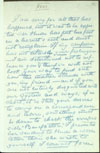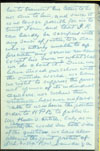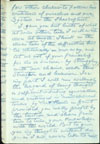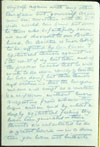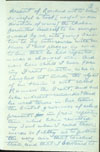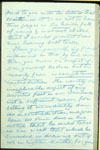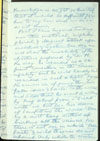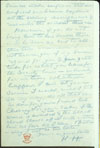Mahatma Letter No. 82: Difference between revisions
| Line 182: | Line 182: | ||
The article "C.C.M. and Isis Unveiled," was written by [[A. O. Hume]] under the pseudonym HX in ''The Theosophist'', Vol. III, No. 12, September, 1882, pp. 324-26. He made these major points: | The article "C.C.M. and Isis Unveiled," was written by [[A. O. Hume]] under the pseudonym HX in ''The Theosophist'', Vol. III, No. 12, September, 1882, pp. 324-26. He made these major points: | ||
* ''Isis'' teems with errors, largely because the text was written by adepts "imperfectly acquainted with English," and compiled by HPB, whose English was also imperfect. | * ''Isis'' teems with errors, largely because the text was written by adepts "imperfectly acquainted with English," and compiled by HPB, whose English was also imperfect. | ||
* Occult philosophy as written by lay disciples will always be incomplete because the adepts withhold knowledge | * Occult philosophy as written by lay disciples will always be incomplete because the adepts withhold knowledge: | ||
<blockquote>the adepts ... differ intellectually in many respects from ourselves. I, for instance, distinctly hold that knowing what they do, it is a sin on their part not to communicate to the world all the knowledge they possess, which would not involve conferring on people unworthy, probably, to exercise them, occult powers. | <blockquote>the adepts ... differ intellectually in many respects from ourselves. I, for instance, distinctly hold that knowing what they do, it is a sin on their part not to communicate to the world all the knowledge they possess, which would not involve conferring on people unworthy, probably, to exercise them, occult powers. I hold that, be a man an adept or what not, all the knowledge he possesses, he holds, simply, in trust for his fellow-men. Under that trust he may reserve, for specially tried disciples, such knowledge as would invest men with abnormal powers over their fellows, but the rest he is bound to give. But they scout any such idea, and hold that the knowledge they possess is their own especial property, to communicate or not to others as they please and they consider this communication, which I hold to be a simple duty, the greatest possible favour and one which must be worked for. | ||
</blockquote> | </blockquote> | ||
* Adepts teach occult subjects in an illogical and misleading way and that European teaching methods are much superior to theirs: | * Adepts teach occult subjects in an illogical and misleading way and that European teaching methods are much superior to theirs: | ||
<blockquote> | <blockquote> | ||
If we wanted to teach any thing, we should teach it piece by piece, and each branch with perfect accuracy. They on the contrary | If we wanted to teach any thing, we should teach it piece by piece, and each branch with perfect accuracy. They on the contrary | ||
seem to care nothing about complete accuracy... It suits them now to have some general conception of their views disseminated and they therefore condescend to vouchsafe stray scraps of information sufficient to enable us to put forth now and again feeble sketches of their views on this or | seem to care nothing about complete accuracy... It suits them now to have some general conception of their views disseminated and they therefore condescend to vouchsafe stray scraps of information sufficient to enable us to put forth now and again feeble sketches of their views on this or that point. But, certainly, in one week I could teach any ordinarily intelligent man, all, that in eighteen months, we all of us have succeeded in extracting from them... one might as well try to argue with a brick wall as with the fraternity, since when unable to answer your arguments they calmly reply that their rules do not admit of this or that. | ||
</blockquote> | </blockquote> | ||
* | * While Hume respects the Brothers, dealing with them is not worth the effort: | ||
<blockquote> | |||
To me personally it appears very far from a hopeful business this dealing with the Brothers — one may respect all, for the great knowledge, in certain lines, that they possess, and for the extremely pure and self-denying lives that they have led and do lead, and one may even heartily love, some if not all of them for their geniality and kindly natures; but their system and their traditions | |||
are opposed to our ideas of right and wrong and it is, to me, still doubtful whether we shall ever be able to get any | |||
good out of their teaching at all commensurate with the expenditure of time and energy that this involves... they are neither, according to our European views, altogether just, nor generous; in a dozen different ways they fall short of the European | |||
ideal of what men so elevated in learning and so pure in personal life should be... | |||
</blockquote> | |||
* Europeans must be forewarned about how very different is the thinking of the Asiatics: | |||
<blockquote> | |||
We have to deal with a set of men almost exclusively Orientals; very learned in some matters, learned beyond the conception of most Westerns, very pure in life, very jealous of their treasured knowledge, brought up and petrified in a system that can only recommend | |||
itself to Eastern minds, and saturated with a stream of thought flowing directly at right angles to that in which runs all the highest and brightest modern Western Thought. | |||
</blockquote> | |||
* Hume suggests three alternatives: | |||
<blockquote> | |||
1. To accept the Brothers as they are — make the best we can of them, accept gratefully such small crumbs as fall from our Masters’ tables and admit once and for all that there is at present no possibility of any such explanation of their policy and system as can he wholly satisfactory to our European (and perhaps as they would tell us, warped and demoralized) minds. | |||
2. To give up the Brothers and their painfully doled out glimpses of the hidden higher knowledge altogether, but to work on in the practical groove indicated by them, labouring to unite all we can in bonds of brotherly love and mutual forbearance and regard. | |||
3. To cut the concern altogether as affording no prospects of any practical results at all commensurate with the time and energy demanded from all who who are to be more than nominal members of the Society. | |||
</blockquote> | |||
=== HPB reaction === | === HPB reaction === | ||
[[H. P. Blavatsky]] wrote about this letter to [[A. P. Sinnett]] on August 26th, 1882. | [[H. P. Blavatsky]] wrote about this letter to [[A. P. Sinnett]] on August 26th, 1882. | ||
Revision as of 19:11, 6 November 2023
| Quick Facts | |
|---|---|
| People involved | |
| Written by: | Koot Hoomi |
| Received by: | A. P. Sinnett |
| Sent via: | unknown |
| Dates | |
| Written on: | unknown |
| Received on: | autumn 1882 |
| Other dates: | unknown |
| Places | |
| Sent from: | unknown |
| Received at: | Simla, India |
| Via: | unknown |
This is Letter No. 82 in The Mahatma Letters to A. P. Sinnett, 4th chronological edition. It corresponds to Letter No. 32 in Barker numbering. In this letter, Koot Hoomi wrote of the trouble that A. O. Hume had stirred up with his article "C.C.M. and Isis Unveiled" in The Theosophist. See below for Context and background.
< Prev letter chrono
Next letter chrono >
< Prev letter Barker
Next letter Barker >
Page 1 transcription, image, and notes
|
I am sorry for all that has happened, but it was to be expected. Mr. Hume has put his foot in a hornet's nest and must not complain. If my confession has not altered your feelings — I am determined not to influence you and therefore will not look your way to find out how the matter stands with you, my friend — and if you are not entirely disgusted with our system and ways; if in short it is still your desire to carry on a correspondence and learn, something must be done to check the irresponsible "Benefactor". I prevented her sending to Hume a worse letter than she wrote to yourself. I cannot force |
NOTES: |
Page 2
|
her to transmit his letters to me nor mine to him; and since it is no longer possible for me to trust Fern, and that G.K. can hardly be sacrificed with any sense of justice, to a man who is utterly unable to appreciate any service rendered except his own, — what shall we do about it? Since we have mixed ourselves with the outside world, we have no right to suppress the personal opinion of its individual members, nor eschew their criticisms, however unfavourable to us — hence the positive order to H.P.B. to publish Mr. Hume's article. Only, as we would have the world see both sides of the question, we have also allowed the joint protest of Deb, Subba Row, Damodar and a |
|
NOTES:
|
Page 3
|
few other chelas — to follow his criticism of ourselves and our System in the Theosophist. I gave you but hints of what at some other time I will write more at length. Think in the meantime of the difficulties that lie naturally in our way, and let us not, if your friendship for me is sincere, — by struggling with our chains, make them straiter and heavier. For my part I will run willingly the hazard of being thought a self-contradicting ignoramus, and criticized in unmeasured terms by Mr. Hume in print, provided you really profit by the tuition, and share from time to time your knowledge with the world. But to give you my thoughts without disguise I am never like to risk |
NOTES: |
Page 4
|
myself again with any other European but yourself. As you now see, connection with the outside world, can bring but sorrow to those who so faithfully serve us, and discredit to our Brotherhood. No Asiatic is ever likely to be affected by Mr. Hume's egotistical thrusts against us (the result of my last letter, and of the promise exacted that he will write to me more rarely and less than he has done) but these thrusts and criticisms that the European readers will accept as a revelation and a confession, without ever suspecting from whence they have arisen and by what a deeply egotistical feeling they have been generated — these thrusts are calculated to do a great harm — in a direction you have not hitherto |
NOTES: |
Page 5
|
dreamt of. Resolved not to lose so useful a tool (useful in one direction, of course) the Chohan permitted himself to be over-persuaded by us, into giving sanction to my intercourse with Mr. Hume. I had pledged my word to him that he had repented, — was a changed man. And now how shall I ever face my Great Master, who is laughed at, made the object of Mr. Hume's wit, called Rameses the Great, and such like indecent remarks? And he used terms in his letters, the brutal grossness of which prevents me from repeating them, which have revolted my soul when I read them; words so filthy as to pollute the very air that touched them, and that I hastened to |
|
NOTES: |
Page 6
|
send to you with the letter that contained it, so as not to have those pages in my house, full of young and innocent chelas, that I would prevent from ever hearing such terms. Then you yourself, my friend influenced in this by him more than you know or suspect of — you yourself deduce but too readily from incompleteness "contradiction." The novelty or inexplicable aspect of any asserted fact in our science is not a sufficient reason for setting it immediately down as a contradiction, and proclaim as Hume does in his article that he could teach in one week that which he succeeded in drawing out of us in eighteen months, for your |
|
NOTES: |
Page 7
|
knowledge is as yet so limited that it would be difficult for him to say how much we do or do not know. But I have lingered too long over this irrational, unphilosophical and illogical attack upon ourselves and System. One day we will show the invalidity of the objections preferred by Mr. H. He may be regarded as a sapient councillor in the municipality, but he could hardly be regarded in such a light by us. He accuses me of giving through him "false ideas and facts" to the world; and adds that he would willingly keep aloof from — break with us but for his desire of benefitting the world! Verily a most easy method of burking all the sciences, for there is not one in which "false facts" and wild theories do not abound. Only while the Western |
|
NOTES:
|
Page 8
|
Sciences make confusion still more confused our Science explains all the seeming discrepancies and reconciles the wildest theories. However, if you do not bring him to his senses there will be soon an end to all — this time irrevocable. I need not assure you of my sincere regard for you and our gratitude for what you have [done] for the Society here — indirectly for us two. Whatever happens, I am at your service. I would, could I but see my way, do all that can be done for your friend Colonel Chesney. For your sake, if the crisis is avoided and the black cloud blows off — I will instruct him as far as I can. But — may it not be too late? Yours in good faith, |
|
NOTES: |
Context and background
The article "C.C.M. and Isis Unveiled"
The article "C.C.M. and Isis Unveiled," was written by A. O. Hume under the pseudonym HX in The Theosophist, Vol. III, No. 12, September, 1882, pp. 324-26. He made these major points:
- Isis teems with errors, largely because the text was written by adepts "imperfectly acquainted with English," and compiled by HPB, whose English was also imperfect.
- Occult philosophy as written by lay disciples will always be incomplete because the adepts withhold knowledge:
the adepts ... differ intellectually in many respects from ourselves. I, for instance, distinctly hold that knowing what they do, it is a sin on their part not to communicate to the world all the knowledge they possess, which would not involve conferring on people unworthy, probably, to exercise them, occult powers. I hold that, be a man an adept or what not, all the knowledge he possesses, he holds, simply, in trust for his fellow-men. Under that trust he may reserve, for specially tried disciples, such knowledge as would invest men with abnormal powers over their fellows, but the rest he is bound to give. But they scout any such idea, and hold that the knowledge they possess is their own especial property, to communicate or not to others as they please and they consider this communication, which I hold to be a simple duty, the greatest possible favour and one which must be worked for.
- Adepts teach occult subjects in an illogical and misleading way and that European teaching methods are much superior to theirs:
If we wanted to teach any thing, we should teach it piece by piece, and each branch with perfect accuracy. They on the contrary seem to care nothing about complete accuracy... It suits them now to have some general conception of their views disseminated and they therefore condescend to vouchsafe stray scraps of information sufficient to enable us to put forth now and again feeble sketches of their views on this or that point. But, certainly, in one week I could teach any ordinarily intelligent man, all, that in eighteen months, we all of us have succeeded in extracting from them... one might as well try to argue with a brick wall as with the fraternity, since when unable to answer your arguments they calmly reply that their rules do not admit of this or that.
- While Hume respects the Brothers, dealing with them is not worth the effort:
To me personally it appears very far from a hopeful business this dealing with the Brothers — one may respect all, for the great knowledge, in certain lines, that they possess, and for the extremely pure and self-denying lives that they have led and do lead, and one may even heartily love, some if not all of them for their geniality and kindly natures; but their system and their traditions are opposed to our ideas of right and wrong and it is, to me, still doubtful whether we shall ever be able to get any good out of their teaching at all commensurate with the expenditure of time and energy that this involves... they are neither, according to our European views, altogether just, nor generous; in a dozen different ways they fall short of the European ideal of what men so elevated in learning and so pure in personal life should be...
- Europeans must be forewarned about how very different is the thinking of the Asiatics:
We have to deal with a set of men almost exclusively Orientals; very learned in some matters, learned beyond the conception of most Westerns, very pure in life, very jealous of their treasured knowledge, brought up and petrified in a system that can only recommend itself to Eastern minds, and saturated with a stream of thought flowing directly at right angles to that in which runs all the highest and brightest modern Western Thought.
- Hume suggests three alternatives:
1. To accept the Brothers as they are — make the best we can of them, accept gratefully such small crumbs as fall from our Masters’ tables and admit once and for all that there is at present no possibility of any such explanation of their policy and system as can he wholly satisfactory to our European (and perhaps as they would tell us, warped and demoralized) minds. 2. To give up the Brothers and their painfully doled out glimpses of the hidden higher knowledge altogether, but to work on in the practical groove indicated by them, labouring to unite all we can in bonds of brotherly love and mutual forbearance and regard. 3. To cut the concern altogether as affording no prospects of any practical results at all commensurate with the time and energy demanded from all who who are to be more than nominal members of the Society.
HPB reaction
H. P. Blavatsky wrote about this letter to A. P. Sinnett on August 26th, 1882.
My dear Mr. Sinnett, I send you a letter just received from Mr. Hume. Read it if you please and judge. Now, I positively and emphatically decline to receive such letters. He may or may not remain in the Society ― it’s the Brothers’ business. He may or may not do it and me under the pretext of philanthropy all the injury he can think of, but he will not do it through me, nor will he take me as his mouthpiece to repeat to K. H. messages which are the most impudent ones in the world. If they have not, I have enough of him and his generous benefactions he forces upon us, if I have to pay such a price as that for it. Why the dickens does he not write all this to K. H. himself? or, have they again quarrelled and the correspondence is stopped? I expected as much and knew it would come to this. He sends me an article for publication; it has and must be absolutely published he says. Now I would have thrown the article into the fire not for what it contains of me, or against Isis ― which he calls there the most inaccurate work full and teeming with practical errors (much he knows of it!) but what it says of the Brothers, when he calls them “selfish Asiatics” blames and criticises them, warns the public against them etc. I certainly would have thrown it into the fire but K. H. sent word with Morya that he wanted it absolutely published and I have of course but to shut up. But he will receive a nice protest from Subba Row and seven or more chelas at the end of it, and he will make himself hated by all the Hindus who believe in the Brothers that’s all. I must say, that if his desire is to obtain knowledge from K. H. he takes funny ways to get it...
I had always said that notwithstanding all his gush & benefactions, he Mr. Hume would become the evil genius of the Society and so he is now. He does that which was never done before; he washes what he imagines to be―and succeeds in making other people imagine―the dirty linen of the sacred Brotherhood publicly in the town bazaars, and criticises in print what he cannot, is unable with his egotistical nature to understand... But I must say, that ever since he began to write for the alleged good of the Society and assumed the rȏle of its benefactor, father & patron, I have received more insults, more kicks from him than from any body I know of. He made of me a consummate liar, a chronic humbug in the Hints (which he hung and burnt in hell-fire); and now he forces me to publish against myself...
Physical description of letter
The original is in the British Library, Folio 1. According to George Linton and Virginia Hanson, the letter was written:
On both sides of 5" X 8" [12.7 X 20.3 cm] sheets of heavy smooth paper, in blue pencil, with large flowing script.[1]
Publication history
Commentary about this letter
Notes
- ↑ George E. Linton and Virginia Hanson, eds., Readers Guide to The Mahatma Letters to A. P. Sinnett (Adyar, Chennai, India: Theosophical Publishing House, 1972), 140.
